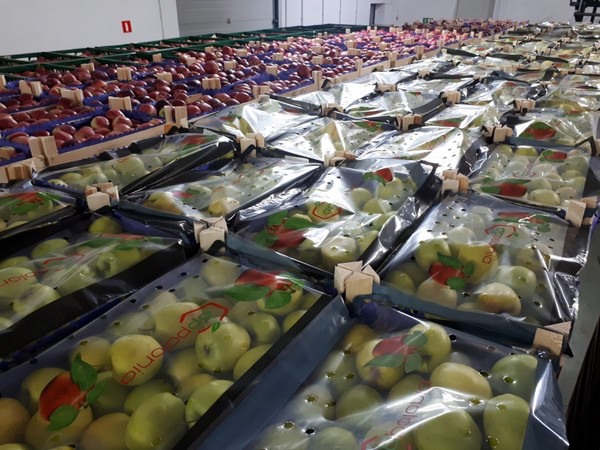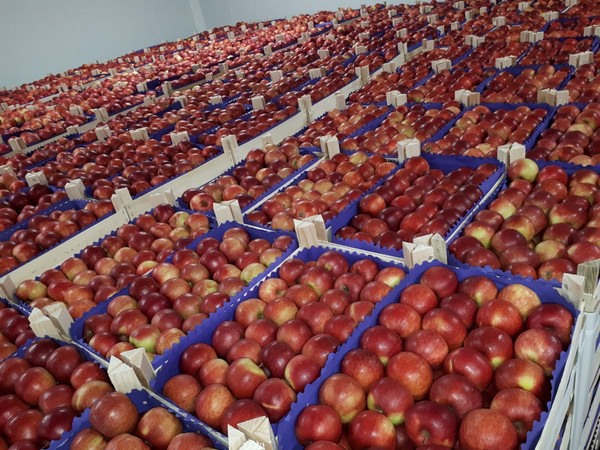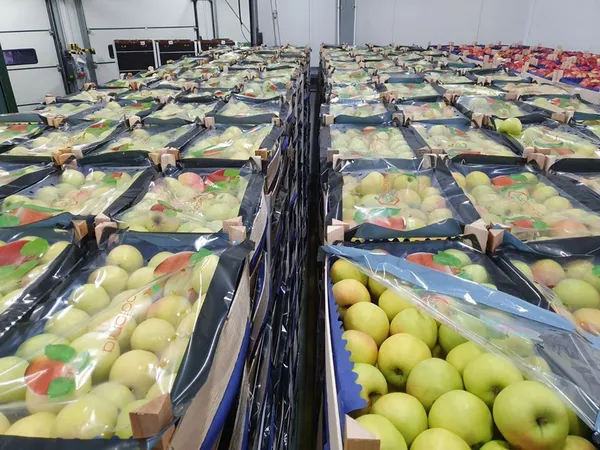The season’s end for Polish apples isn’t going as smoothly as traders and growers were hoping. Demand is low, important markets are inaccessible to exporters and there’s a war right at the Polish border. These things combined will cause the usual gap between seasons to disappear this year.
Jakub Krawczyk, export manager for Appolonia, states it’s been very rough for Polish apple growers and traders. Most of these challenges have to do with the war in Ukraine: “The past six weeks were very hard for everyone, starting from producers and ending with the consumer. Almost everything you want to buy is more expensive, and people are really thinking twice before they spend their money. The war in Ukraine is still on, it has turned many peoples’ lives upside down. Now there are more than 2.7 million refugees in Poland, 95% of them are women and children, they need our help and support and all country is still involved in humanitarian actions.”

To make the season even more challenging, stocks of apples are still rather high in Poland, so much so that Krawczyk thinks there will be no gap between the current apple season and the next one. “The volumes of available apples are still quite big, for some varieties the availability is bigger than it should be. Varieties like Royal Gala, Red Jonaprince, Golden or Champion are the ones that concern us the most. If the sale difficulties will continue, we will sell these varieties for much longer than usual. In our opinion in July and August we will still have stocks, so it looks like the seasons will not have a gap between one and another.”
“Current demand is very low, we don’t remember such a bad situation when it comes to sales. Export to Belarus is banned, Egypt is not importing at the moment, and those were the two biggest receivers of our apples. Western Europe is full with apples, people don’t buy as much as before, so we send significantly fewer tons abroad. The Middle East is still buying some apples, but there is only a narrow range of specification they prefer, so we can’t sell all products to this region. Some producers are still selling their goods to India, but I think when Southern Hemisphere apples appear, the season for our apples has almost come to an end in Asia.”

Krawczyk has hopes that the local market can help out with buying varieties that are normally used for export: “When it comes to the Polish domestic market, there’s been normal quantities of apples being ordered, but we think it could be even better if they could also help us with varieties that we still have big stocks of. We think that there should be some program in the European Union that could help growers to withdraw their fruits, even donated as humanitarian deliveries to Ukraine, which seems to be the most reasonable direction for that kind of actions, specially that there is a big need of everything there right now.”
Although the costs of literally everything seem to be increasing, the prices for apples themselves aren’t moving due to the low demand. This is a problem for the industry, Krawczyk explains. “The cost of storing is rising every month and the price for apples should have grown as well, but unfortunately it didn’t. Some could say that they noticed little increase of the price, but it wasn’t the cost of apples that rose, it was the cost of packaging and transport. The apple price itself hasn’t increased significantly.
"As the price can’t rise, due to low sales and the cost of production increasing, the margin is getting lower. Sometimes people don’t want to even sort their apples, because it doesn’t make any sense and they are forced to throw their apples towards industry destinations. Growers should receive more support from the government and supermarket chains in these hard times, because the situation for some producers is simply dramatic. If you were preparing your plantation for a year's to supply to Belarus and suddenly that market has been closed, you need some alternative to sell your product.”

The season isn’t completely lost yet though, and Krawczyk sees multiple possibilities for the season’s end to be salvaged. However, the situation is simply too uncertain to predict the future: “Everyone hopes that the lower consumption will end soon and we will be able to sell all our stocks for the right price. Nobody wants to sell good apples for industry. If the situation with Egyptian laws change, it would help to export our products. If the stocks in Europe drop, we’ll be able to sell more apples to the West, but those are big ‘if’s’. It’s really hard to predict a few weeks ahead, especially when you have a war just behind your border.”
“We were very happy to exhibit at Fruit Logistica in Berlin again. There were fewer visitors and exhibitors this year, but there still were many interesting meetings that could evolve into fruitful cooperation. It was very nice to meet some of the old friends and partners and visiting Berlin is always a pleasure.” Krawczyk concludes.
For more information:
Jakub Krawczyk
Appolonia
Tel: +48 785 342 930
Email: jakub.krawczyk@appolonia.pl
www.appolonia.pl
